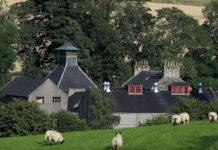Advice and staff training a top priority for suppliers

For publicans trying to navigate this diverse category, Scotland’s wine suppliers say they are well-placed to assist operators in developing a wine offer that will help their venue stand out from the competition.
And now may be the best time to make the most of the services on offer.
Amy Ledger, of Continental Wine & Food (CWF), claims an improved economy has increased consumer confidence, leading to a “willingness to loosen the purse strings” and experiment with their wine choices.
Ledger suggested publicans “take time to speak to your suppliers who can provide recommendations of new wines – there are some wonderful wines out there at the moment”.
With consumers reckoned to be more open to experimenting with different wines, Louise Boddington, wine buyer at Crown Cellars, said outlets “can no longer offer just white, red and rosé”.
“They need to treat the wine category, even in a local wet-led pub, with a lot more care and attention,” she said.
“Consumers are more knowledgeable and have higher expectations on the quality of the liquids offered, but are also demanding value for money.”
Boddington added that operators who get this right can expect more than a boost in profits.
“It offers operators the ability to differentiate their outlet,” she said.
Liam Dunn of wholesaler Matthew Clark agreed on the potential for outlets to use wine as a point of difference.
“I think that wine offers an operator the opportunity to demonstrate their expertise in selecting a unique range of specially-selected wines from around the world to enhance and complement their food offering,” said Dunn.
“Due to the vast selection of wines on offer from across the wide selection of wine merchants trading in Scotland, there is no other category in my opinion that offers such diversity and quality, and there is always a new wine to try from a yet undiscovered region of the world.”
Thankfully, publicans don’t need to build and promote their wine offer alone, and suppliers were keen to remind operators that help is at hand.
Staff training is one of the main tools wine merchants can employ to help licensees to improve their wine offer.
“Staff training is another vital service we provide our customers, however it has to be far more than a box ticking exercise,” said Dunn.
“We believe that the customer’s staff need to get under the skin of the wines they are selling, they need to understand where the wine comes from. Not just the country but the specific region, who made the wine, what flavours and aromas does it exhibit and what styles of food will it complement.
“All this gives the wine its provenance and allows the customers to differentiate their wines from their competition.”
James Taylor of Gordon & MacPhail agreed that “knowledge is key” when it comes to wine sales.
“Training of both staff and customers is an on-going activity,” said Taylor.
“We believe it is important that all our staff are appropriately trained – even our delivery drivers have been through WSET training.
“This year has seen us register our head office as a WSET training centre and we are about to roll out training to new staff throughout our bases.”
Taylor highlighted the “always evolving” nature of the Gordon & MacPhail wine list, of which an up to date version is always available electronically to customers.
“This means we are on top of vintage changes, new products, special offers and product information including tasting notes,” said Taylor.
International Wine Services marketing manager Angela Ham agreed on the importance of supplier support.
She said the company, part of C&C Group, is able to draw on the resources of sister businesses Tennent Caledonian and Wallaces TCB to ensure customers are well-serviced.
“As well as the ongoing great pricing and regular offers, we can offer POS and glassware support, tastings, a wine list creation service, and expert advice and staff training from their experienced wine development managers,” said Ham.
In addition to providing direct support for publicans, Enotria’s in-house training, brand management and design team also helps to identify and develop trends in the Scottish trade, according to sales director Leslie Somerville.
“For Enotria, wine is what we do and it is understanding the changing face of the market that helps us be at the forefront of adding value to our clients,” said Somerville.
Jon Harris, of Hallgarten Druitt, said he expects the “real resurgence” of the wine category to continue. He said his firm has recently invested in the Scottish market and now operates with three WSET-trained account managers in Scotland.
“It is a really interesting time for the wine industry with younger generations on a voyage of discovery, searching out new wines and styles faster than any other group,” said Harris.























